| Home / Environment / News | Tools: Save | Print | E-mail | Most Read |
| Central China Bans Pearl Farming to Restore Water Quality |
| Adjust font size: |
Central China's Hubei Province has banned pearl farming in all lakes, rivers and reservoirs in an attempt to prevent water quality from worsening, local aquatic products administration said yesterday. Pearl farms have covered a total area of 13,000 hectares in the province, and the annual output has exceeded 400 tons, a spokesman with the administration said. The administration said it would not approve new applications to establish such farms, and has ordered all water areas used to cultivate pearls to be cleaned. Over the past several months, blue-green algae outbreaks, usually caused by pesticides runoffs and other pollutants, have been reported in Taihu Lake, Chaohu Lake and the Dianchi Lake in southwestern China, endangering domestic water supplies. Zhou Shengxian, director of the State Environmental Protection Administration (SEPA), unveiled a set of tough new rules early July to tackle worsening pollution in the three lakes. The rules include a ban on all projects involving discharges containing ammonia and phosphorus. He also ordered all fish farms to be removed from the three lake areas by the end of 2008.
Pearl farming in central China's Hubei Province (file photo) (Xinhua News Agency August 13, 2007) |
| Tools: Save | Print | E-mail | Most Read |
 |
| Related Stories |

